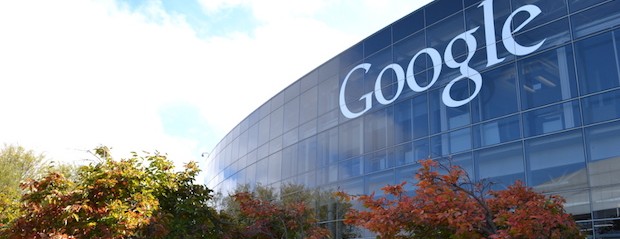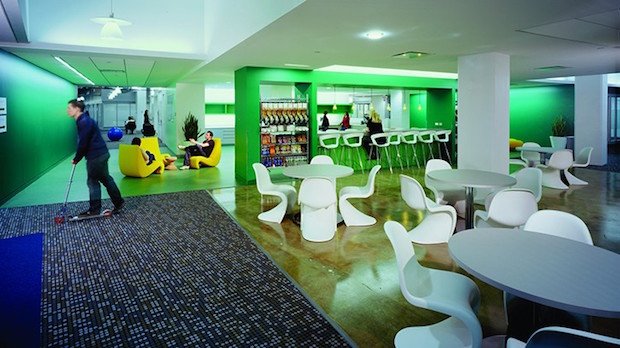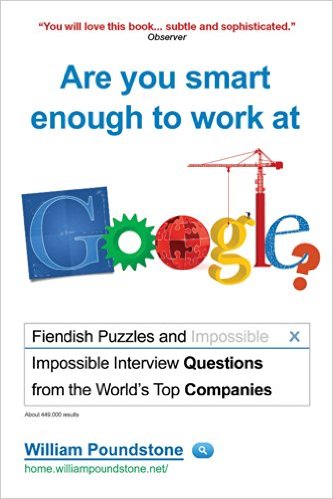There is more to life than one’s job, though we who are fortunate to be doing what we love most might not always give that impression. Such is the perspective which many outstanding schools, including our own, share with their students, in keeping with a humanistic vision of education as a process of helping young people to become who they are in the fullest sense, to borrow language from the Greek poet Pindar [1]. Yet in addition to believing in the value of learning for its own sake, great educational institutions never lose sight of the fact that we are also preparing students for life after twelfth grade. We aim for our graduates to be virtuous human beings across all aspects of existence, to be lifelong learners, to be exemplary citizens of the world…and to be significant contributors to whatever profession they eventually chose for themselves.
Apple or Google?
One of the cafeterias at Google’s New York office.
So it is that my conversations with students will sometimes turn to the jobs they hope to pursue. Since the Rentrée, I have had just such an exchange about one of the most visionary firms of our era, with a particularly exciting reputation among our youngest generations: Google. It took place with a student who happens to be passionate about computer programming and who answered in the negative when I asked if she would ever be interested in working for Apple, replying instead, “I’d rather be at Google.” Why, I asked? Because they’re always coming up with new ideas, came her answer.
This comment brought to mind a highly engaging book by William Poundstone I read some time ago, whose title says it all: Are You Smart Enough to Work at Google: Trick Questions, Zen-Like Riddles, Insanely Difficult Puzzles, and Other Devious Interviewing Techniques You Need to Know to Get a Job Anywhere in the New Economy (New York: Little Brown, 2012). I appreciate this text because of the brain-teasers and outside-of-the-box conundrums it contains, all of which are a welcome source of stimulation on a rainy day. Take the following illustration, perhaps the best-known instance of a Google interview topic: “You are shrunk to the height of a nickel and thrown into a blender. Your mass is reduced so that your density is the same as usual. The blades start moving in sixty seconds. What do you do?”
“Imagination is more important than knowledge”
But I also enjoy Poundstone’s book because it echoes much of what we know to be important for success in the 21st century: creative problem-solving. Or to employ the term we have adopted in our new strategic plan, Our Vision: Aujourd’hui et Demain: innovation. As the author writes, “The blender riddle encapsulates the process of inventing…You begin by brainstorming. There are many possible answers, and you shouldn’t be in a hurry to settle for the first idea that seems ‘good enough’…’Imagination is more important than knowledge,’ Einstein said. You don’t have to be Einstein to answer the question well, but you do need the imagination…(p. 13).” The goal is to explore that imagination, building on existing knowledge, but thinking beyond it, expanding the horizons of possibility by collaborating with others, and having the courage, empathy and practical agility to design something novel. When I posed the nickel question to our budding coder, her insights were brilliant. And the imagination she demonstrated transcended the Googleplex by far. I’m sure Google would be a terrific place to work, I said to her. Yet how about starting your own company? Yes, she replied, I’d like that even more.
[1]. “Become such as you are, having learned what that is. Genoi oios essi mathôn“About the Author :
Sean Lynch was Head of School at the Lycée Français de New York from 2011 to 2018, after having spent 15 years at another French bilingual school outside of Paris: the Lycée International de St. Germain-en-Laye. Holding both French and American nationalities, educated in France (Sciences Po Paris) and the United States (Yale), and as the proud husband of a French-American spouse and father of two French-American daughters, Sean Lynch has spent his entire professional and personal life at the junction between the languages, cultures and educational systems of France and the United States. In addition to being passionate about education, he loves everything related to the mountains, particularly the Parc National du Mercantour.



